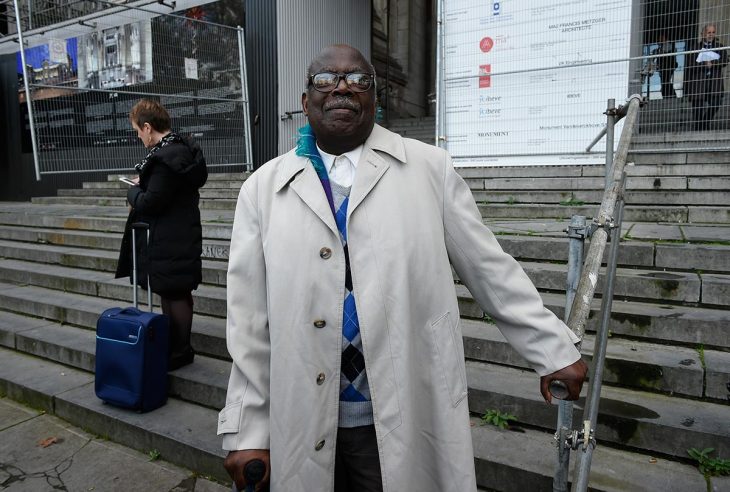Fabien Neretse remained impassive, sitting in the box of the accused, dressed in a dark suit, tie and white shirt, listening to a long and damning verdict that only spared him for two murders that the prosecutor himself had asked to be dropped.
The jurors followed the straight line drawn by the federal prosecutor, Arnaud d'Oultremont. No room for doubts in this decision handed down on the evening of 19 December by the Brussels court of assizes where, despite the late hour, the public was present in large numbers. Two full days of deliberation were necessary for the twelve jurors to sort through the hundred or so testimonies heard in six weeks.
Guilty of crimes in Mataba and Kigali
Fabien Neretse is convicted of creating, maintaining and financing an Interahamwe militia in his native village of Mataba, north-western Rwanda, where he had settled by mid-April 1994. This militia had killed Anastase Nzamwita near Mataba in May 1994 and Joseph Mpendwanzi, a Hutu political opponent, near Muvuba on 19 June 1994, as well as an unknown number of people who remained unidentified or poorly identified. For these murders, he is found guilty of war crimes.
Some twenty testimonies strongly overlapped regarding the kidnapping of Joseph Mpendwanzi by the Interahamwe. All of them reported that he had been found in a house where he was hiding, then taken away by the militiamen, tied up, and transported in the dumpster of Fabien Neretse's pick-up truck, driven by Neretse himself. The accused's explanation that his vehicle was in fact requisitioned and that he had tried to dissuade Mpendwanzi's kidnappers from taking this man was found not convincing. The jurors simply described his story as "implausible".
Fabien Neretse was also convicted of denouncing his neighbours in the Nyamirambo district of Kigali on 9 April 1994, before he left the capital for Mataba. These facts were much less clear-cut than those described in Mataba. The point was to demonstrate that Fabien Neretse had contacted the military to warn them that several Tutsi families in his neighbourhood were preparing to flee. The Sisi, Gakwaya and Bucyana families had gathered in the Sisi plot and had already loaded the cars with their luggage when the military and Interahamwe militia burst in. They shot dead eleven people, including Belgian Claire Beckers, wife of Isaiah Bucyana, and attempted to kill three. Fabien Neretse was convicted of nine of the eleven murders and three attempted murders, all of which were again qualified as war crimes.
With the intent to destroy the Tutsis
The task was delicate because there was no trace of a telephone call made by Fabien Neretse to military authorities and no one had heard him tell the military that the said families were about to flee. But the jurors took the plunge. Ernest Gakwaya, who lost his wife and daughter in the attack, said he saw Neretse pointing at the Sisi house to the military. And Régine Bategure, a survivor of the shooting, said "someone from Neretse's house" was there with the soldiers. According to Neretse's lawyers, these isolated testimonies or circumstantial evidence raised doubts: "For 25 years, the rumor has been going around that it was Fabien Neretse who called the military. But after 18 years of investigation we don't have a witness who can confirm that it was him who called them. It's a rumour! The rumour distorts things and it hurts," lawyer Jean-Pierre Jacques had hammered home, arguing that another lead had been completely abandoned by the investigation, that of Evariste Nyampame, a major of the Rwandan Armed Forces who lived in the same neighbourhood and had a view of the Sisi plot.
There remained the crime of genocide. This was the first time that an accused had been prosecuted for it in Belgium and it was declared established by the court. The jurors had to decide whether Fabien Neretse had committed all these murders with the intention of destroying the Tutsi ethnic group. In doing so, they took into account the few testimonies about Neretse saying that people should "continue to hunt Tutsis in the hills", or about his instructions to the Interahamwe that they should not "exhaust themselves digging holes but take the killed Tutsis to the Nyabarongo River".
The defendant's misstep
During the trial, Fabien Neretse persisted in saying that he had saved Tutsis, that he was very friendly with his neighbour Evariste Sisi and that he was no longer an influential man in the ruling MRND party since he had been ousted from his position as director of OCIR-Café, the parastatal organisation managing the sale and export of coffee. But he did not convince the jurors. One event probably lost him: a false statement by Joseph Mpendwanzi's son, which he himself filed in court. "Mr. Neretse Fabien, I agree to restore your rights because I know that you are a victim of injustice," said the document, signed by Jean-Paul Mpendwanzi, to which was attached a copy of his identity card. The alleged author of the document, heard as a witness by the court, strongly denied having said such a thing, as he was a direct witness to the capture of his father by the Interahamwe, transported by Neretse.
Questioned by the president of the court, the accused had replied that the document had been given to him by "people in Rwanda" whose names he could not mention without endangering their safety. An explanation which left the court perplexed. In pleadings, the civil party did not hesitate to denounce "mafia practices". "We witnessed a defense that I would describe as genocidal propaganda. Witnesses were prepared before their hearing by the accused. It's not just a question of buying witnesses, there are also threats, pressure on witnesses and forgeries," said lawyer Michèle Hirsch.
Twenty-five years after the facts, Fabien Neretse is therefore found guilty in the genocide of the Tutsis in Rwanda. Before the jury retired to deliberate, he had had these last words: "I will not stop saying that I had many Tutsi friends. I believe that it is through education and understanding of our history that we can fight injustices and my conviction or acquittal will not change that. »







